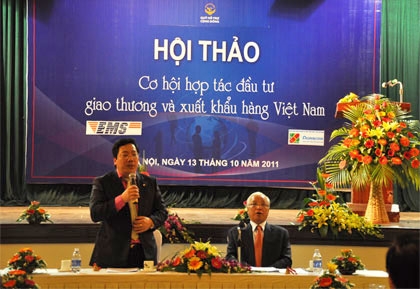Vietnamese abroad push local produce
 |
| Photo source : quehuongonline.vn |
In the conference themed "Opportunities for cooperation, investment, trade and export of Vietnamese goods", Nguyen Thanh Son, deputy minister of Foreign Affairs, who is also head of the State Committee for Overseas Vietnamese Affairs (COVA), said: "Overseas Vietnamese communities now live in 103 countries and territories and most of them are concentrated in big markets like the US, the EU and Eastern Europe.
"However, the paradox is that most of the goods our communities are trading and distributing are made in China, Thailand and Turkey."
He attributed the discrepancy to the fact that Vietnamese goods have difficulty penetrating certain markets and to the loose co-operation between domestic Vietnamese companies and those abroad.
Deputy chairman of the Vietnam Association of Small and Medium Enterprises (VINASME) To Hoai Nam said domestic enterprises often hesitated to export goods to foreign markets due to fears of legal risks.
"When I asked them why, they [domestic enterprises] said if they failed to win a law suit, they would probably lose capital that had taken them 20 years to accumulate.
"I also find that local companies often do not have a deep understanding of foreign consumer tastes and they miss opportunities due to being over-cautious," he said.
"On the other hand, administrative procedures are described as one of the biggest obstacles facing Vietnamese enterprises in foreign countries when it comes to importing and distributing made-in-Vietnam products."
Although the government had many favourable policies, the obstacles lied in policy implementation, he said.
The hesitation of overseas Vietnamese businesspeople also stemmed from worries about risks such as poor domestic infrastructure and food safety, Nam added.
Nguyen Thanh My, permanent deputy chairman of the Business Association of Overseas Vietnamese, said overseas Vietnamese often chose products from China, India and Turkey to sell because they were affordable and nicely designed. Meanwhile, some Vietnamese products, despite having locally recognised brand names, were still not enticing to foreign markets, especially the EU and the US.
Domestic companies had not put a lot of investment into product design, marketing and promotion activities, or in extras such as after-sales services, he said.
Therefore, the two mains problems that needed to be addressed were product design and distribution strategies, he stressed.
My suggested that the state should co-operate with business communities abroad to set up wholesale or trade centres in foreign countries in order to facilitate the penetration of Vietnamese goods and build on the strength of overseas Vietnamese businesses.
Chairman of the Vietnamese businesses association in Hungary Pham Ngoc Chu said: "We find that European consumers prefer Vietnamese goods such as noodle soups, canned fruits and green tea over Chinese options."
However, Vietnamese companies should pay more attention to product design and colour so that buyers could easily differentiate Vietnamese goods from Chinese ones, he said.
"Chinese goods are often recognised by their red packaging, but considering the current situation of climate change and temperature increase, we should use harmonious packaging with the soft colour of nature."
Chu also suggested Vietnamese firms should link hot news with production. He used the fortune teller octopus in Spain, which was admired by football fans throughout the world during the World Cup season last year, as an example.
He said Vietnamese companies could have sold thousands of T-shirts or other souvenirs if they had been decorated with the octopus symbol.
During the conference, Deputy Minister of Industry and Trade Nguyen Thanh Bien called for Vietnamese companies abroad to take full advantage of new policies, such as nationality, house and land ownership, and investment preference, to enrich themselves in Vietnam and contribute to the country's socio-economic development.
They were asked to use their knowledge of foreign cultures, business and management to act as a bridge between Vietnamese goods and foreign markets and help domestic enterprises meet criteria to avoid lawsuits from foreign consumers.
The Ministry would continue streamlining administrative procedures and create favourable conditions for Vietnamese enterprises in the country and abroad to develop their businesses and open export markets, Bien affirmed. The conference was jointly held by the Ministry of Foreign Affairs and VINASME.
What the stars mean:
★ Poor ★ ★ Promising ★★★ Good ★★★★ Very good ★★★★★ Exceptional
Related Contents
Latest News
More News
- Hermes joins Long Thanh cargo terminal development (February 04, 2026 | 15:59)
- SCG enhances production and distribution in Vietnam (February 04, 2026 | 08:00)
- UNIVACCO strengthens Asia expansion with Vietnam facility (February 03, 2026 | 08:00)
- Cai Mep Ha Port project wins approval with $1.95bn investment (February 02, 2026 | 16:17)
- Repositioning Vietnam in Asia’s manufacturing race (February 02, 2026 | 16:00)
- Manufacturing growth remains solid in early 2026 (February 02, 2026 | 15:28)
- Navigating venture capital trends across the continent (February 02, 2026 | 14:00)
- Motivations to achieve high growth (February 02, 2026 | 11:00)
- Capacity and regulations among British areas of expertise in IFCs (February 02, 2026 | 09:09)
- Transition underway in German investment across Vietnam (February 02, 2026 | 08:00)

 Tag:
Tag:




















 Mobile Version
Mobile Version